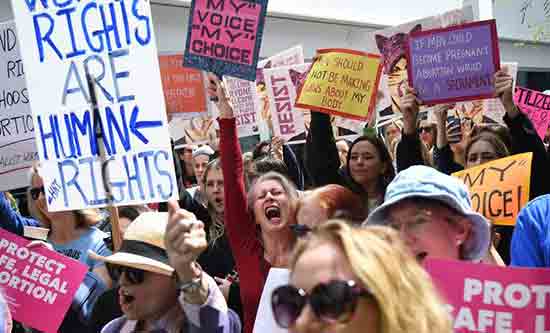
Serious attempts are underway across the US to criminalise abortion. Since the beginning of 2019 at least eight states have introduced extreme, restrictive legislation. This ranges from legislation which makes abortion illegal in almost every case from conception, to so-called ‘heartbeat’ bills which would make abortion illegal from about six to eight weeks of pregnancy – before most women even know they are pregnant. The aim of those driving through this legislation is to force the issue to the Supreme Court, which now has a conservative majority, with a view to overturning the landmark Roe vs Wade case of 1973 which legalised access to abortion across the United States. But they are already facing mounting resistance, both on the streets and in the courts. Rachel Francis reports.
On 15 May, Alabama’s state governor Kay Ivey signed into law the ‘Alabama Human Life Protection Act’ which could make it illegal to perform an abortion unless there is a ‘serious health risk’ for the woman or in cases of lethal foetal abnormalities. Whilst women will not be criminalised, abortion providers could face up to 99 years in prison, essentially removing access to safe, legal abortion. While the Act will not be implemented for six months, if at all, Ivey was clear about the ideological motives behind it:
‘Many Americans, myself included, disagreed when Roe v Wade was handed down in 1973. The sponsors of this bill believe that it is time, once again, for the US Supreme Court to revisit this important matter, and they believe this act may bring about the best opportunity for this to occur.’
Politicians across the country are making similar moves in attempts to force the issue at the level of the Supreme Court. These changes take place against a background of ever-reducing provision which already makes it difficult for women to access services. Currently in Alabama there are only three abortion clinics left. Women must make two visits to a clinic, 42 hours apart, before they can access an abortion, a particular burden on women who already have young children, or who cannot easily travel or take time off work. The long list of inane, bureaucratic considerations clinics must conform to is hugely restrictive. Abortion care is not covered by insurance in the state except in a few extreme circumstances.
The Alabama bill comes alongside bills passed in Missouri, Georgia, Ohio, Kentucky and Mississippi. It is worth remembering that these are mostly ‘segregationist’ states, with a long history of racism and reaction. At least nine other states are considering similar laws. Missouri will outlaw abortion even in cases of rape or incest; Ohio’s legislation ensures abortion will not be covered by insurance plans and so even in the few circumstances it will be permitted, many women will be unable to afford it. John Becker, the Republican representative introducing the bill, was widely ridiculed for an exception the bill makes to the insurance rule so that it covers the reimplantation of an ectopic pregnancy into the womb – a medical impossibility.
Legal challenges are being put into place urgently but will be slowly heard over the next year. Meanwhile, the actions of the Supreme Court judges will be significant. President Donald Trump publicly stated that he is ‘strongly pro-life, with the three exceptions – rape, incest and protecting the life of the mother’. He was quick to praise the new judges appointed since the start of his presidency at federal and Supreme Court level for championing ‘a positive attitude about the right to life’ and has made it clear that abortion will be a key political issue for his 2020 presidential campaign. Earlier this year his administration made clear its direction as it banned federal family planning funds from going to health providers who perform or refer patients for abortion services – a move dubbed a domestic ‘gag’ law. Whilst polls consistently report that less than a quarter of the population supports a full abortion ban – and 58% of Americans support the right to abortion in ‘most’ or ‘all’ cases – this is set to increasingly become a battleground for the control of reproductive rights as well as the power of the courts to set new precedents. Other states are moving to defend or extend their current abortion rights. While for now abortion remains technically ‘legal’ in all 50 states, it is far from safe, free or accessible, and is certainly under threat. The outcome will depend on the resistance to come.
Too much media attention has focused on individualised or sensationalised resistance at the expense of mass movements on the ground. There are campaigns for women to share their own experiences of abortion, for Hollywood to boycott states with restrictive legislation and calls for a ‘sex strike’. This response blurs the fact that what is at stake is a public health and social question for the working class – abortion must be free, safe and accessible for all women on demand alongside decent reproductive healthcare. What has not attracted reporters’ attention but is more urgent, hopeful and necessary, is the mobilisation of people on the streets protesting and of groups coming together to mount legal challenges and the defence of services that currently exist. For communists in Britain, this includes fighting for abortion in the North of Ireland, which still has legislation even more restrictive than that being proposed in Alabama.
Fight Racism! Fight Imperialism! 270 June/July 2019




